Web developers pick a database that works best for their project, looking at how fast it is, how much it can grow, and how it deals with data.
Databases can enhance their data modeling, storage, and retrieval skills, which are crucial for efficient and effective software development. The choice of database determines the success of a web app.
That is why you need to know about database lists.
Here, we’ll explore the top 10 web app databases for 2024. Read on to learn more about it.
What is a Database?
A database is a system that stores and organizes data in a structured way, making it easy to retrieve, manage, and update information.
A database is like a big digital filing cabinet where data is neatly stored and organized. This makes it super easy to find, manage, and update any piece of information you need. It’s a vital tool in software applications, playing a key role in handling and keeping track of vast amounts of data.
According to Business Research Insight, the global market for database management systems (DBMS) is booming. Its market size was USD 38450 million in 2022 and is expected to reach USD 225148.44 million in 2031, exhibiting a CAGR of 21.7% during the forecast period. See the graph below:
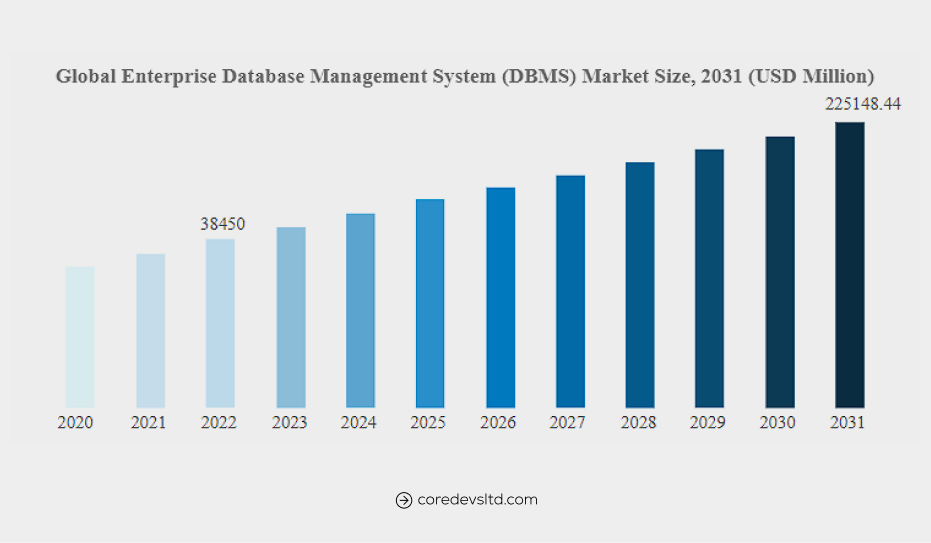
Why Are Databases Important for App Development?
Databases are super important for creating web apps for a few big reasons:
Storing and Managing Data
Apps need a place to keep data safe and sound, even when they’re closed or restarted. Databases do this job, keeping everything organized in tables and fields. This makes it easier to check, find, and change data.
Handling More Users and Data
When more people start using an app, databases help manage the extra load. They can grow by getting more powerful or by spreading data across more servers. This means the app can handle more users without slowing down.
Keeping Data Correct and Consistent
Databases make sure that all the data changes are done right, especially when many people are using the app at the same time. They have rules and checks to keep the data accurate and in good shape.
Protecting Information
Databases let you control who can see or change data, which is really important for keeping private information safe. They can also encrypt data, making it hard for unwanted people to read it.
Quick Access and Efficiency
Databases use special tools like indexing to find data really fast. This is great for apps that need information right away. They can also remember common requests, making it quicker to get the same information again.

Top 10 Best Web App Database List to Use in 2024!
In 2024, there will be many great databases for web apps, each with its own strengths. Our list of the top 10 databases is perfect for different kinds of projects, big or small.
Here, we made a list of the top 10 best Databases for web applications to use in 2023, each with its own unique offerings. Let us have a look:
1. Oracle Database
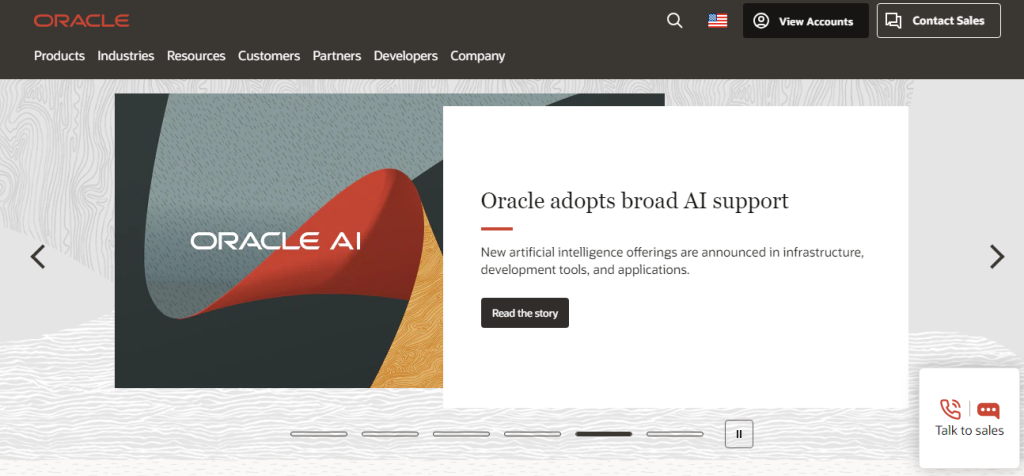
Ideal for complex web applications, especially in large companies, Oracle stands out for its robustness.
It’s great for handling intricate transactions and is a go-to choice for applications dealing with sensitive information.
Here’s why it’s suitable for web development:
- Enhanced Security: Oracle comes with advanced security features that help keep web transactions safe and protect user data.
- Fast Processing: Thanks to its in-memory data grid, Oracle can process web requests in real time, making it much faster.
- Java Integration: If you’re working on a Java-based web application, Oracle’s integration with Java makes it a particularly strong option.
2. MySQL
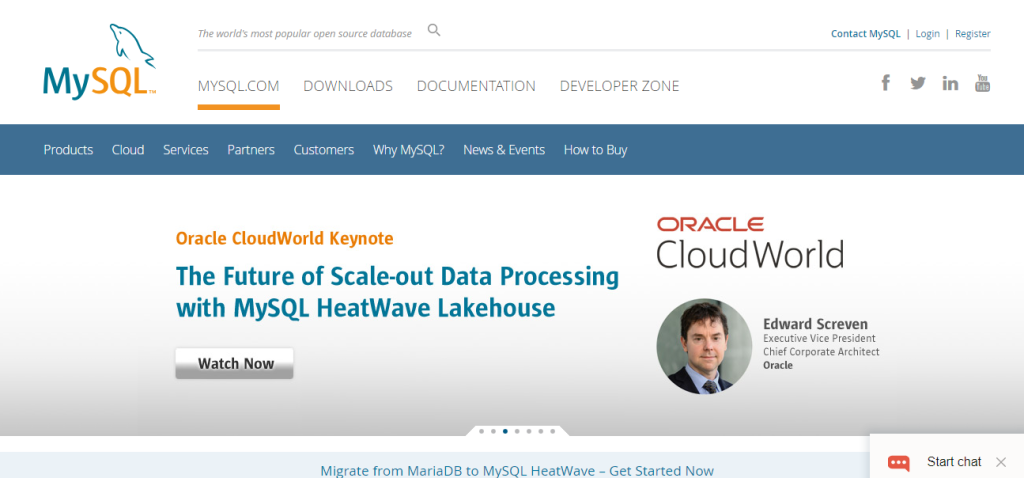
MySQL is a favorite among web developers for its performance and user-friendliness.
It’s a key component of the LAMP stack (Linux, Apache, MySQL, PHP), making it a natural choice for a wide range of web applications.
Here’s what makes MySQL great for web development:
- User-Friendly: MySQL is easy to set up and manage, which is ideal for small to medium-sized web applications.
- Strong Transactional Support: It ensures that your data remains consistent, which is crucial for maintaining the integrity of web applications.
- Scalability: With efficient replication features, MySQL can handle increasing web traffic, making it a scalable choice for growing applications.
3. Microsoft SQL Server
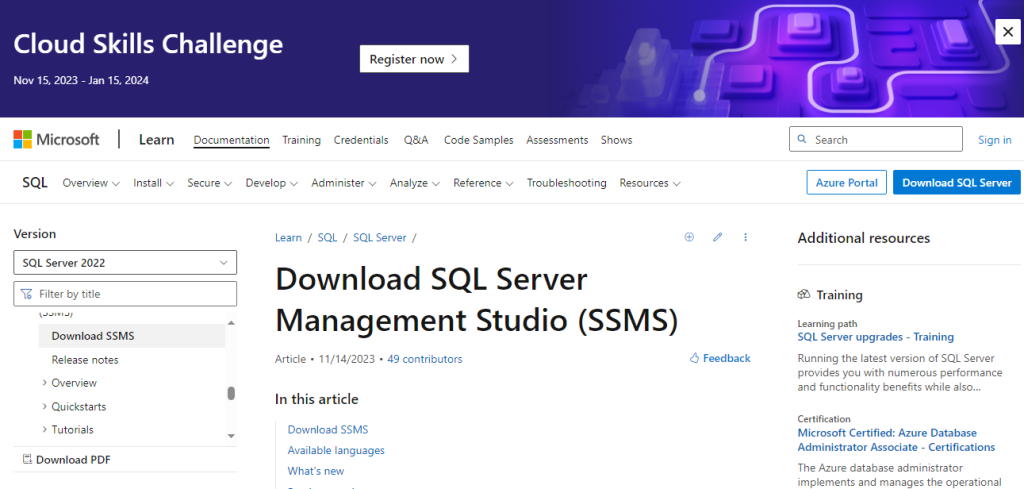
It is particularly effective for web applications that are built in a Microsoft-centric ecosystem, like those using ASP.NET.
It’s known for its comprehensive security features, which are essential for applications that manage sensitive information.
Here’s why Microsoft SQL Server is a strong option for web development:
- Microsoft Integration: SQL Server works seamlessly with other Microsoft services, including Azure. This makes it a preferred choice for .NET applications.
- Fast Transactions: Thanks to its in-memory Online Transaction Processing (OLTP), SQL Server can handle web transactions quickly and efficiently.
- Robust Security: It offers advanced security measures to ensure that web data is well-protected against various threats.
4. IBM DB2
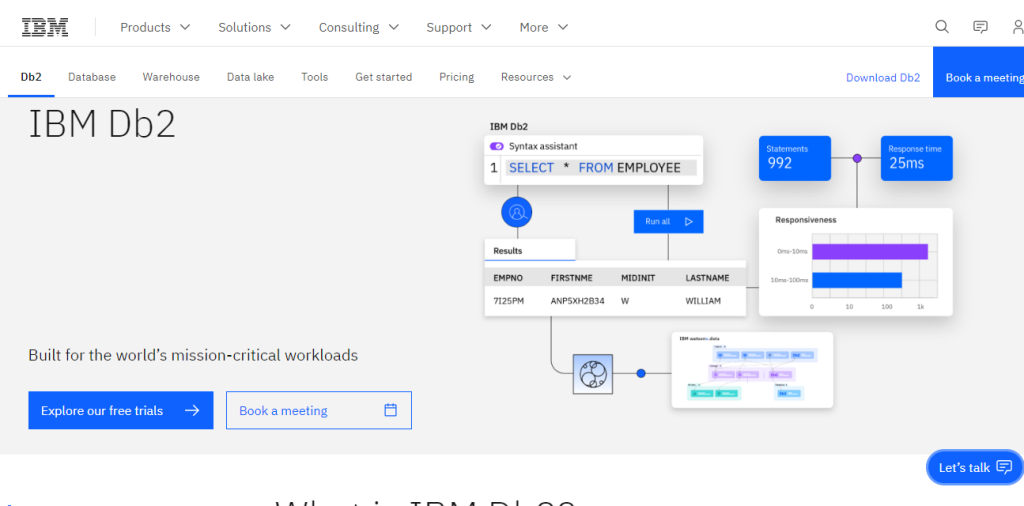
This database is a solid pick for web applications that need to be always available and require sophisticated data management.
Its integration with artificial intelligence (AI) capabilities makes it a forward-thinking choice, especially for creating dynamic and intelligent web applications.
Here are some of the key features of DB2 for web development:
- High Availability: DB2’s High-availability disaster recovery (HADR) feature ensures that your web application is always up and running, minimizing downtime.
- Smooth Integration: It works well with a variety of popular web development languages and frameworks, offering a seamless development experience.
- AI Capabilities: The AI-infused features of DB2 open up new possibilities for creating personalized and intelligent web experiences.
5. PostgreSQL

Known for being a powerful and open-source object-relational database system, PostgreSQL is a top choice for complex web applications.
Its extensibility and advanced SQL functionality are key reasons why developers prefer it.
Here’s what makes PostgreSQL stand out for web development:
- Customizable: Its extensibility means you can add custom functions tailored to your web application’s specific needs.
- Concurrency Control: This feature ensures smooth access for multiple users at the same time, which is crucial for any web application.
- Reliability: PostgreSQL offers high availability and robustness, ensuring consistent performance for your web application.
6. MongoDB
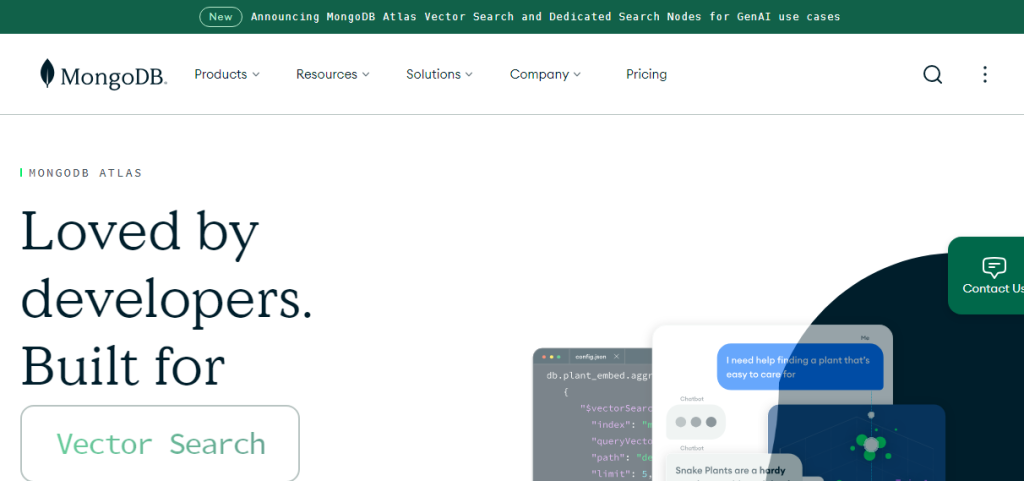
This database is a standout choice for web applications that handle large amounts of data, particularly when the data doesn’t fit neatly into traditional table formats.
MongoDB‘s document-oriented NoSQL approach offers several advantages for web development. Here are some key features:
- Flexible Data Model: Being schema-less, MongoDB allows for greater flexibility in managing and structuring web data.
- Scalability: It supports horizontal scaling through sharding, making it well-suited for web applications that experience high traffic and large volumes of data.
- Advanced Query Support: MongoDB’s ability to handle complex queries and secondary indexes means you can build rich and functional web applications.
7. Redis
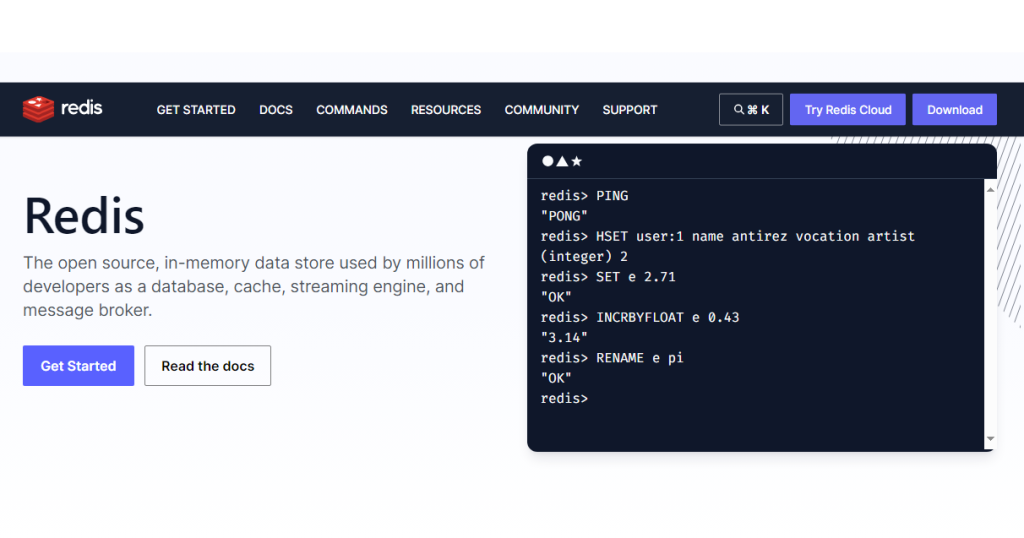
Primarily used as a caching layer in web development, Redis is renowned for its exceptional speed and versatility in supporting various data structures.
It’s a key player in reducing latency and increasing the speed of web applications.
Here are some of the features that make Redis valuable for web development:
- Fast Caching: Redis handles data in memory, which means it can cache information super-fast, significantly reducing the latency of web applications.
- Real-Time Capabilities: Its Publish/Subscribe (Pub/Sub) capabilities are ideal for real-time web features, such as chat applications or live updates.
- Data Persistence: While often used for caching, Redis also offers data persistence, allowing it to serve as a lightweight primary data store for smaller web applications.
8. Cassandra
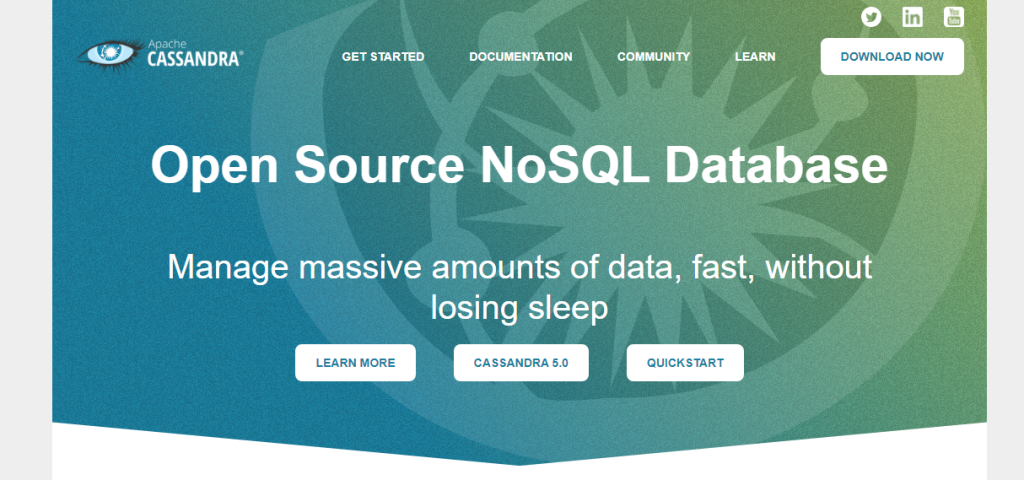
Ideal for handling large amounts of data distributed across multiple servers, Cassandra is known for its scalability and fault tolerance.
It’s a great choice for web applications that require robust, distributed database systems.
Here’s why Cassandra is beneficial for web development:
- Scalability: It excels in environments where data and traffic are continuously growing, easily scaling horizontally.
- High Availability: Cassandra’s distributed architecture ensures that there is no single point of failure, making it highly reliable.
- Flexible Data Storage: It supports a wide variety of data formats, which is useful for web applications dealing with diverse data types.
Read our Hbase vs. Cassandra blog to learn how they are compared.
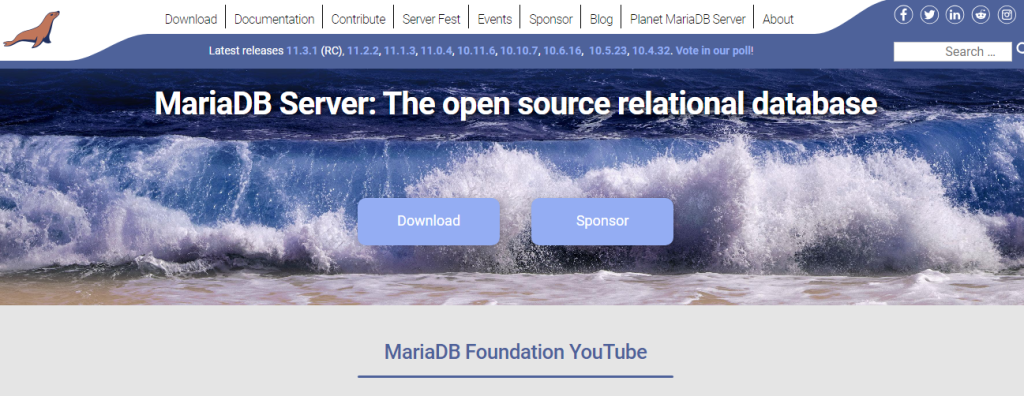
9. MariaDB
As a fork of MySQL, MariaDB offers enhanced features while maintaining compatibility with MySQL.
It’s a solid choice for those looking for a robust, scalable, and open-source SQL database.
Features for web development include:
- Compatibility with MySQL: This makes transitioning from MySQL seamless, with many improvements in speed and functionality.
- Open-Source Flexibility: MariaDB’s open-source nature allows for customization and free use, which is great for budget-conscious projects.
- Advanced Features: It includes several built-in advanced features like replication, clustering, and improved query optimization.
10. SQLite
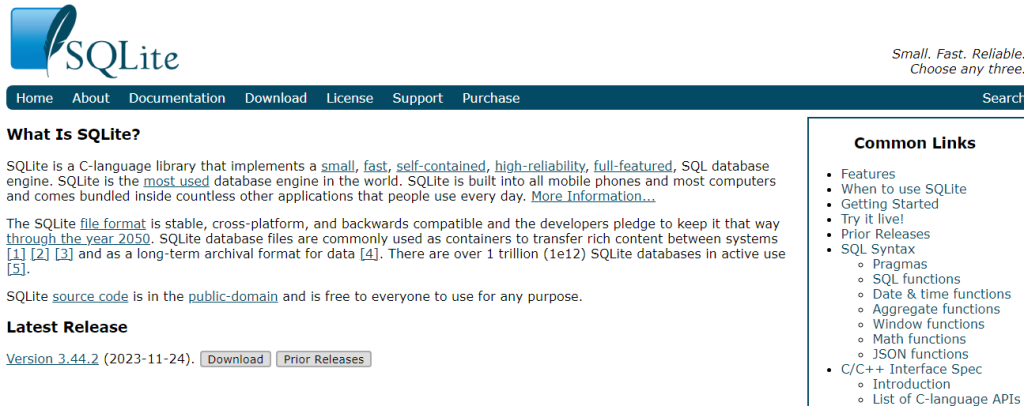
Known for its simplicity and lightweight nature, SQLite is an embedded SQL database engine widely used in small to medium-sized web applications.
It’s particularly useful for applications that require a simple yet reliable database solution without the overhead of a full database server.
Key features include:
- Zero Configuration: SQLite requires no setup or administration, making it incredibly easy to use and maintain.
- Lightweight: Its small size and resource efficiency make it ideal for applications with limited resources or that need to run on client-side environments.
- Reliability: Despite its simplicity, SQLite is reliable and supports most of the SQL standards, making it a dependable choice for many web applications.

Final Words
Selecting the ideal database from our extensive database list is key to the success of your web application.
Whether you’re handling complex data, scaling up, or ensuring high performance, there’s a perfect match for every need.
Keep in mind that selecting the ideal database does more than just simplify your development journey; it lays a solid groundwork for ongoing growth and creative advancements.
